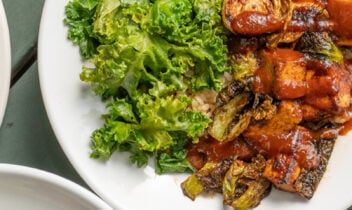TheBUZZ: Soy burgers are not as healthy as you’ve been led to believe?
WHAT THEY’RE SAYING
Soy isolate and other forms of soybeans that are used in many vegetarian products do not have as many benefits as soybeans themselves.
WHAT WE KNOW
Imagine yourself out to dinner craving a fat, juicy burger! To satisfy your craving, you choose the “more sensible veggie burger.” But are veggie burgers really the better choice?
Soy, in its natural form of soybeans, has many benefits …
Soy is available in many forms …
- Soybeans – The natural form
- Tofu – A bean cake made of soybeans
- Soy Milk – Ground soybeans
- Soy Nuts – Baked soybeans
- Edamame – Boiled and steamed soybeans
- Tempeh – Fermented soy
- Soy Sauce – Sauce made of soy and salt
- Soy Isolate/Soy Protein – A dry powder food ingredient that has been separated or isolated from the other components of the soybean
Soy isolate/soy protein is often used as a meat substitute and is sometimes referred to as textured vegetable protein (TVP) or textured soy protein (TSP). It reduces the fat and cholesterol in a product and contains more fiber than most meat products.
HOW DO WE KNOW THIS?
The creation of soy isolate includes many steps that separate the carbohydrate, fat and protein content to provide a high protein meat alternative. It‘s not fully known whether these steps alter the nutrient content of the soybeans.
One of the best reasons for choosing a veggie burger is to cut saturated fat. Depending on its size, a regular hamburger contains 4-7 grams of saturated fat where most veggie burgers contain 0-1 gram of saturated fat.
OUR ADVICE
When it comes to soy, minimal processing is best! For the highest amount of isoflavones (antioxidants), stick with whole soybeans, soymilk, tofu and soy nuts.
How to Choose Your Veggie Burgers
- Choose veggie burgers with less than 300 mg of sodium per serving.
- Look for burgers with more iron than others (aim for at least 10% of the Daily Value) that are fortified with vitamin B-12 (especially if you’re vegetarian).
- Top burgers with lots of fruits & veggies—pineapple, onions, lettuce, tomatoes, mushrooms, and roasted pepper are good choices.
- Try your hand at making homemade soy burgers. This will limit the amount of processing and retain the beneficial compounds that soy offers.
- Choose veggie burgers that use soy isolate as the protein source.
The most important thing is that you eat your fruits & veggies … prepared healthfully!
|


